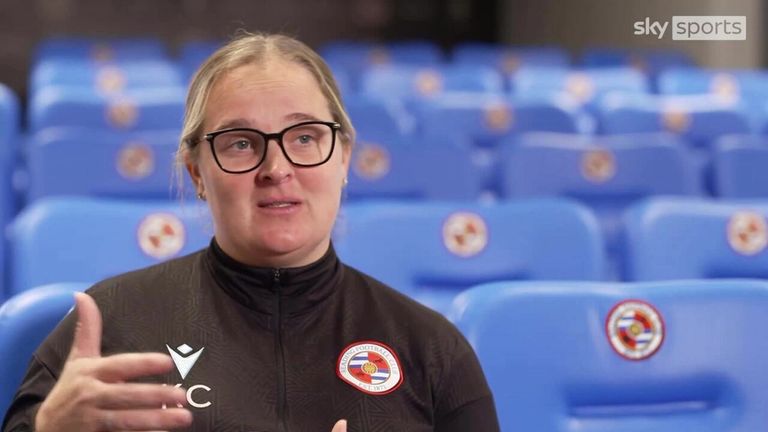Emma Mukandi: Reading vow to learn from maternity experiences of captain to improve women’s game | Football News
Reading want to learn from the experiences of their captain Emma Mukandi, who has spoken about the difficulties she faced when returning to football after having a baby.
Mukandi gave birth to her daughter in November 2021 and took six months off, resuming at the start of this season, but has revealed the lack of maternity conditions available to WSL players.
The Scotland defender told Off the Ball’s COYGIG Podcast how she faked an injury at the beginning of her pregnancy as no maternity conditions existed in her contract at the time, has had to breast pump in a cupboard since returning and is banned from having her child onsite due to club policy.
Reading manager Kelly Chambers believes they “did the best we could” for Mukandi with the club the first to go through the process and that the player’s comments – highlighted by The Daily Telegraph – were not meant to be interpreted as criticism of the club.
“My immediate reaction has been in support of Emma because, if you listen to the podcast, it doesn’t correlate with the articles that are coming out now about the club not supporting her,” Chambers told Sky Sports.
“She hasn’t done anything wrong or said anything. It’s a case of how it’s been interpreted by different media.
“We felt we did the best we could for Emma. Every pregnancy is different. As someone who has gone through pregnancy, I know what my body could take, and those were the sort of conversations we had with Emma every day.”
Mukandi also told the podcast that she faked injury to initially hide her pregnancy “in case it didn’t go down well”. At the time she gave birth, there were no maternity rights in place and she would have just been entitled to statutory maternity pay.
In 2022, the FA changed its rules, making it mandatory for WSL players to get 14 weeks’ pay and although Mukandi’s experience pre-dates this, Reading say it knew the policy was being brought in and decided to honour it.
The club says it gave Mukandi eight-and-a-half months of full pay, something that it was not required to do. Mukandi believes the new FA policy is inadequate, particularly for players at smaller clubs.
“If I was to have a kid now, I don’t think I’d be able to return 14 weeks after giving birth. Bearing in mind that your body is your job,” she said.
“So, who has even come up with that? Surely not someone who has played football and had a baby. Is that a man?
“If a Sunday was to come… and I couldn’t get childcare then I just can’t play that game. They’ve put this policy out, and I feel like there’s such a grey area.
“It comes down to whatever club you’re at. Like if you’re at an Arsenal or a Chelsea or a Man City and you’ve got loads of money, great facilities and that, having a baby there is not an issue at all but I think the lower down the league you go it’s easier for club CEOs to be like ‘No, this isn’t happening.’
“I don’t think there is enough stuff in place to make women think ‘I could do it [have a baby.]”
Chambers added: “I think we supported Emma in the best way we could, in the contractual side of things when Emma gave birth.
“She had no maternity package in her contract as a standard FA player contract would have, and it was in the process of happening with the FA, the PFA and FIFA.
“We worked with the PFA to speed up the process of that but with Emma we honoured that maternity package early throughout her whole pregnancy, her childbirth and post that.
“People are aware of what the FIFA maternity policy is – you should return after 14 weeks of full pay but when it came to the 14th week, Emma wasn’t ready to return to football.
“Physically and mentally she wasn’t ready to let her child go to childminders. She was a new mum who wasn’t ready to do that, so we supported her with that.
“After she gave birth, she was meant to return around January/February time, but she actually came back pre-season this season. We supported her and honoured a maternity package for the whole of those eight-and-a-half months.”
Mukandi has raised the issue of not being able to have her child onsite with the Professional Footballers’ Association.
She said of the policy: “They basically said it was a club policy and that they didn’t have the right insurance to cover it but I just feel like that’s a bit of a cop-out.
“For me, I was just a bit more disappointed because they never came and spoke to me. It was just this email that got put out. Which I felt was pretty directed at myself. I thought ‘if this is about me, why didn’t we have a conversation about it?'”
Chambers believes football still has a long way to go in forming appropriate maternity conditions.
“Going through that process now with Emma, I think that everything we do is a learning curve and we think about what we can do better. The Women’s Game is in its infancy when it comes to handling maternity,” she said.
“In the USA, the game is great in terms of what it does for female players, but it’s very new here. As much as we want it to go forward as quickly as possible, it’s going to take time.”



Pingback: apps that pay cash
Pingback: sites
Pingback: stapelstein balance board
Pingback: for sale online
Pingback: diyala research
Pingback: MelBet